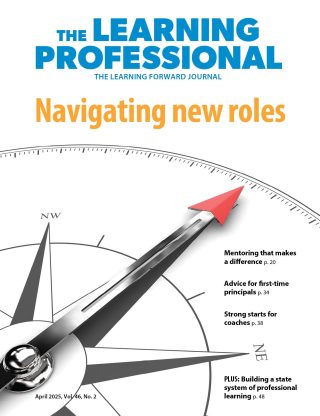FOCUS
Pilot study examines the feasibility of a peer coaching model
By Megan Leamon, Julie Q Morrison, Daniel S. Newman and Todd Haydon
August 2024
Read the remaining content with membership access. Join or log in below to continue.
Sed ut perspiciatis unde omnis iste natus error sit voluptatem accusantium doloremque laudantium, totam rem aperiam, eaque ipsa quae ab illo inventore veritatis et quasi architecto beatae vitae dicta sunt explicabo. Nemo enim ipsam voluptatem quia voluptas sit aspernatur aut odit aut fugit, sed quia consequuntur magni dolores eos qui ratione voluptatem sequi nesciunt. Neque porro quisquam est, qui dolorem ipsum quia dolor sit amet, consectetur, adipisci velit, sed quia non numquam eius modi tempora incidunt ut labore et dolore magnam aliquam quaerat voluptatem.
References
Allison, S. & Harbour, M. (2009). The coaching toolkit: A practical guide for your school. Sage Publications.
Bowman, B.L. & McCormick, S. (2000). Comparison of peer coaching versus traditional supervision effects. The Journal of Educational Research, 93, 256-261.
Folsom, J.S., Smith, K.G., Burk, K., & Oakley, N. (2017). Educator outcomes associated with implementation of Mississippi’s K-3 early literacy professional development initiative (REL 2017–270). U.S. Department of Education, Institute of Education Sciences, National Center for Education Evaluation and Regional Assistance, Regional Educational Laboratory Southeast.
Hasbrouck, J.E. (1997). Mediated peer coaching for training preservice teachers. The Journal of Special Education, 31, 251-271.
Knight, J., Elford, M., Hock, M., Dunekack, D., Bradley, B., Deshler, D.D., & Knight, D. (2015). 3 steps to great coaching. The Learning Professional, 36(1), 10.
Kohler, F.W., Crilley, K.M., Shearer, D.D., & Good, G. (1997). Effects of peer coaching on teacher and student outcomes. The Journal of Educational Research, 90(4), 240-250.
Moats, L.C. & Tolman, C.A. (2019). Language Essentials for Teachers of Reading and Spelling (LETRS) (3rd ed.). Voyager Sopris Learning.
Murray, S., Ma, X., & Mazur, J. (2009). Effects on peer coaching on teachers’ collaborative interactions and students’ mathematics achievement. Journal of Educational Research, 102(3), 203-212.
Ohio Department of Education and Workforce. (2019). Ohio’s model for peer coaching for literacy. Author.
Shaaban, S.S.A. (2022). Video-based reflection and peer coaching in enhancing TEFL student-teachers’ teaching practices of receptive skills. Journal of Education and E-Learning Research, 9(2), 103-109.
Sheehy, K. & Ceballos, L.H. (2018). The expert next door: Lesson observations and peer feedback. Tools for Learning Schools, 21(3), 1-3.
Yee, L.W. (2016). Peer coaching for improvement of teaching and learning. Journal of Interdisciplinary Research in Education (JIRE) ISSN, 2232, 0180.
Recent Issues
LEARNING DESIGNS
February 2025
How we learn influences what we learn. This issue shares essential...
BUILDING BRIDGES
December 2024
Students benefit when educators bridge the continuum of professional...
CURRICULUM-BASED PROFESSIONAL LEARNING
October 2024
High-quality curriculum requires skilled educators to put it into...
LEARNING TO PIVOT
August 2024
Sometimes new information and situations call for major change. This issue...
















